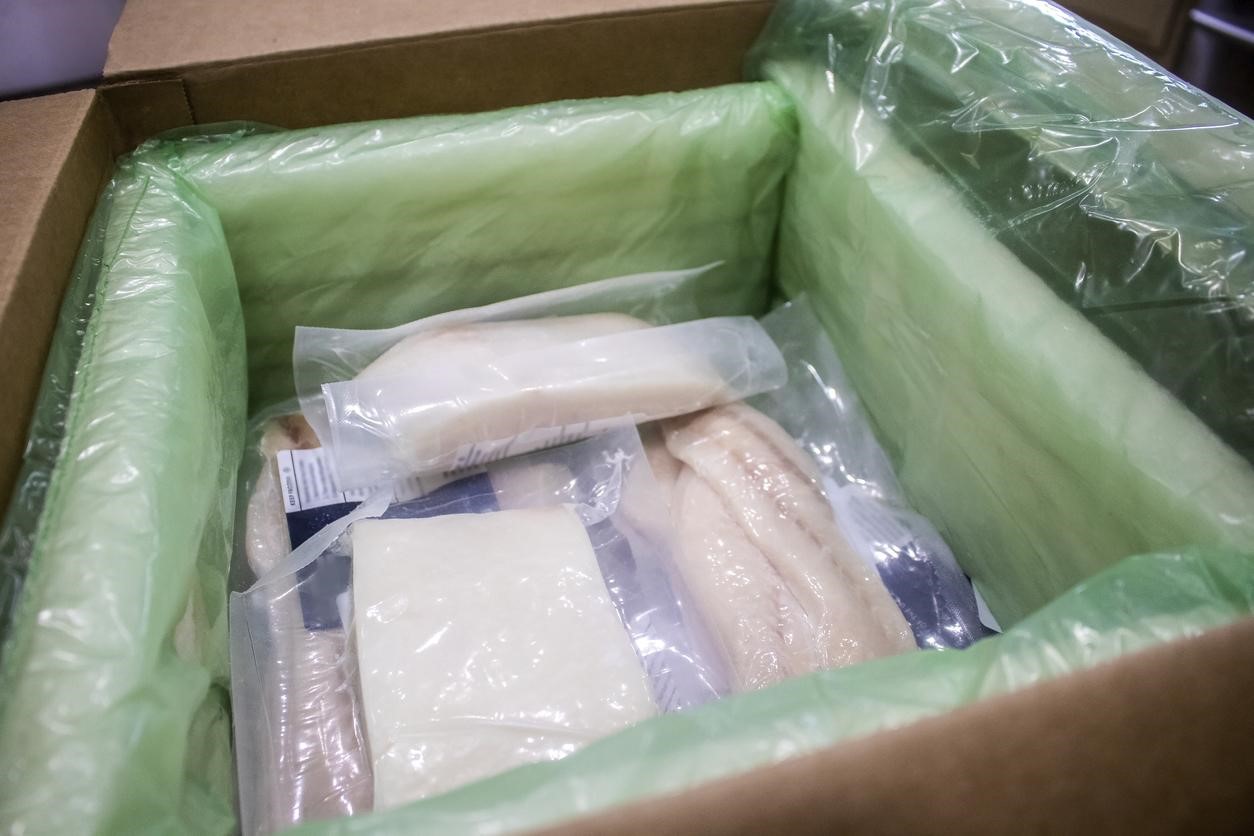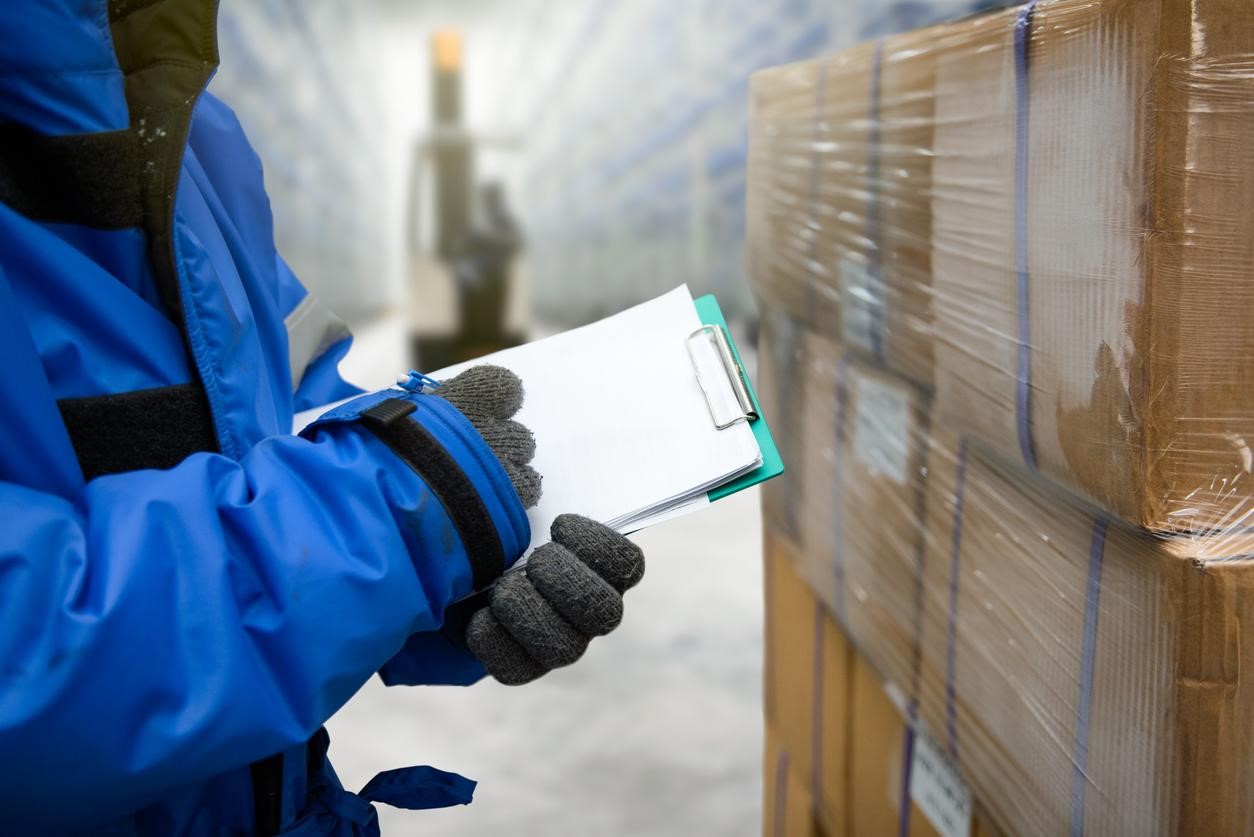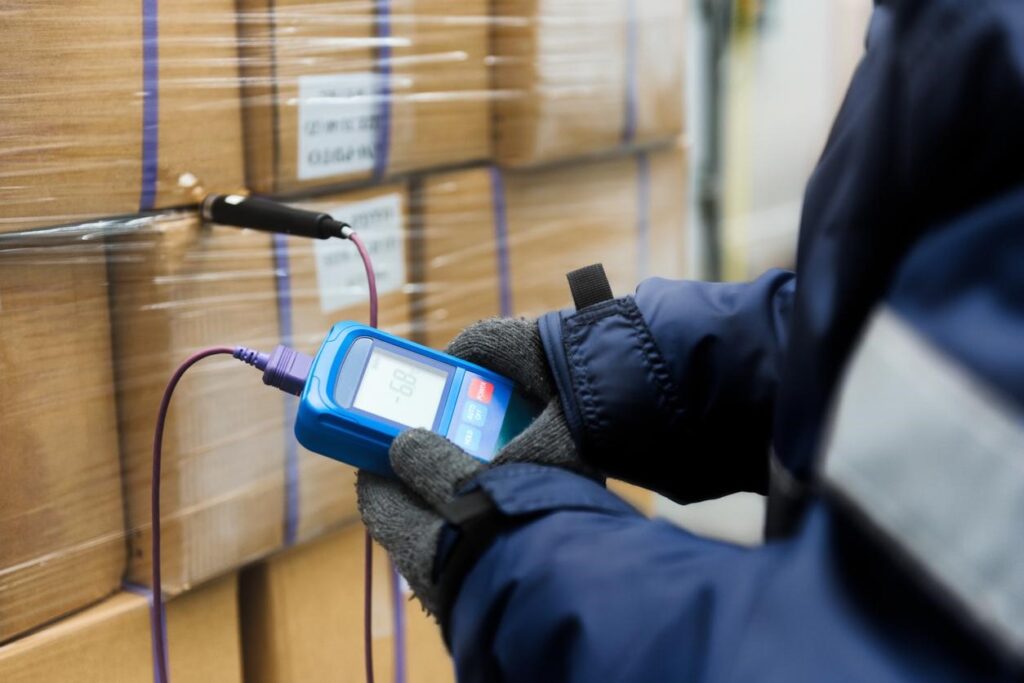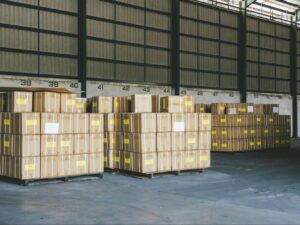In the intricate balance of global supply chains, few are as delicate and crucial as the one orchestrated by cold chain logistics. Picture this: from the buzzing production lines of pharmaceutical labs to the lush vineyards yielding the perfect bottle of wine, a silent guardian ensures that everything stays perfectly cool, preserving quality and efficacy at every turn.
In this overview of the cold chain, learn about what cold chain means and what fulfillment industries can benefit from this style of logistics management – and find out how products arrive in pristine condition no matter where they need to go.
What Are Cold Chain Logistics?
Cold chain logistics refers to the management and transportation of temperature-sensitive products, such as perishable goods, pharmaceuticals, and certain chemicals, within a specified temperature range. The goal of cold chain logistics is to maintain the integrity and quality of these products from the point of origin to the final destination. This typically involves keeping the products within a controlled temperature environment, often referred to as the “cold chain,” throughout the entire supply chain process.
Key Components of Cold Chain Logistics
- Temperature Control: The primary focus is on maintaining a consistent and controlled temperature throughout the entire supply chain. This may involve refrigerated storage, transportation, and distribution facilities.
- Monitoring and Tracking: Continuous monitoring of temperature conditions is crucial. Advanced technology, such as temperature sensors and data loggers, is often used to track and record temperature fluctuations in real time. This data helps ensure that products remain within the specified temperature range.
- Cold Storage: Specialized cold storage facilities are designed to store temperature-sensitive products. These facilities are equipped with refrigeration systems that maintain the required temperature levels.
- Transportation: Cold chain logistics involves refrigerated or temperature-controlled vehicles, containers, and packaging to transport goods without compromising their quality. These vehicles are often equipped with temperature monitoring and control systems.
- Quality Assurance: Strict quality control measures are implemented to ensure that products meet regulatory standards and consumer expectations. This may include regular inspections, testing, and adherence to industry-specific guidelines.
Cold chain logistics is particularly critical for industries such as food and beverage, pharmaceuticals, and healthcare, where the quality and safety of products are highly dependent on temperature conditions. Any deviation from the required temperature range can lead to spoilage, degradation, or loss of efficacy in the case of pharmaceuticals.
Effective cold chain management helps reduce waste, minimize product loss, and ensure that consumers receive high-quality, safe products. It also plays a crucial role in meeting regulatory requirements and maintaining the integrity of sensitive products throughout their journey in the supply chain.
3 Main Components of Cold Chain
1. Storage Facilities
These facilities are designed to provide controlled and consistent temperature environments for storing temperature-sensitive products. Cold storage warehouses are equipped with refrigeration systems to maintain the required temperature levels. Temperature-controlled storage is crucial to prevent spoilage, degradation, or loss of efficacy of products.
2. Transportation
Cold chain transportation involves vehicles, containers, and packaging designed to maintain the temperature integrity of products during transit. Refrigerated trucks, containers, and air freight services are commonly used to transport perishable goods from manufacturers to distribution centers, retailers, or end-users. The vehicles are equipped with refrigeration systems, temperature monitoring devices, and insulation to ensure that products remain within the specified temperature range.
3. Monitoring and Control Systems
Continuous monitoring of temperature conditions is essential to ensuring that products are maintained within the required temperature range throughout the supply chain. Advanced technology, such as temperature sensors, data loggers, and monitoring devices, is used to track and record temperature fluctuations in real time. Control systems help regulate temperature, humidity, and other environmental conditions in storage facilities and during transportation.
These components work together to create a seamless cold chain that ensures the quality, safety, and integrity of temperature-sensitive products from production to consumption. Effective coordination and management of these components are crucial to preventing any deviations in temperature that could compromise the quality of the goods being transported or stored.
Examples of Cold Supply Chain Uses

Cold supply chain examples involve the transportation and storage of temperature-sensitive products throughout various industries. Many different industries can enjoy the benefits of cold chain logistics:
Food and Beverage Industry
Perishable food items such as fruits, vegetables, dairy products, and frozen goods require a cold supply chain to maintain freshness and prevent spoilage. Temperature-controlled transport and storage facilities are essential to preserving the quality and safety of food products.
Pharmaceutical Industry
Many pharmaceutical products, vaccines, and biologics are highly sensitive to temperature fluctuations. A precise and controlled cold supply chain is crucial to maintaining the efficacy and safety of these medications. Temperature-controlled storage and transportation help prevent degradation and ensure that pharmaceuticals reach their destination in optimal condition.
Biotechnology and Life Sciences
Biological samples, reagents, and other materials used in research and medical diagnostics often require a cold supply chain to preserve their integrity. Laboratories, research institutions, and companies in the biotechnology and life sciences sectors rely on temperature-controlled logistics to maintain the quality of their sensitive materials.
Chemical Industry
Some chemicals and substances are temperature-sensitive and may require specific conditions during transportation and storage. Cold supply chain practices are employed to prevent changes in chemical composition and ensure the safety and effectiveness of these products.
Healthcare Industry
Medical devices, diagnostic equipment, and certain healthcare products may have temperature-sensitive components. A cold supply chain is important in the healthcare industry to protect the functionality and reliability of such equipment and devices.
Floral Industry
Cut flowers and plants are highly perishable and can wilt or degrade quickly if not kept at the right temperature. Cold supply chain logistics are used to transport and store flowers from growers to retailers, ensuring they reach consumers in optimal condition.
Seafood Industry
Fresh and frozen seafood products require a cold supply chain to maintain quality and prevent spoilage. Refrigerated containers and transportation methods are employed to preserve the freshness of seafood during distribution.
These examples highlight the diversity of industries that rely on cold supply chain practices to safeguard the quality, safety, and efficacy of their products. The precise requirements of the cold supply chain can vary depending on the specific needs of each industry and the temperature sensitivity of the products involved.
A Look Toward the Future of Cold Chain

The future of cold chain logistics is expected to see several advancements and innovations to meet the evolving demands of industries such as food and beverage, pharmaceuticals, and healthcare. Some key trends and developments that may shape the future of cold chain logistics include:
Technology Integration
Continued integration of advanced technologies such as the Internet of Things (IoT), sensors, and RFID (Radio-Frequency Identification) allows for real-time monitoring and tracking of temperature-sensitive products. Enhanced data analytics and artificial intelligence (AI) applications are needed to optimize supply chain efficiency, predict potential issues, and improve decision-making.
Blockchain Technology
Implementation of blockchain technology enhances traceability, transparency, and security in the cold chain. Blockchain can provide an immutable record of temperature data, ensuring the integrity of the supply chain.
Automation and Robotics
Increased use of automation and robotics in cold storage facilities improves efficient inventory management, picking, packing, and loading processes. Autonomous vehicles and drones may be used for last-mile delivery in the cold chain, reducing human intervention and improving speed and accuracy.
Sustainability Initiatives
There is a growing emphasis on sustainability within the cold chain, with a focus on reducing energy consumption, utilizing eco-friendly refrigerants, and adopting green logistics practices. This may lead to the development of more energy-efficient refrigeration technologies and cold storage solutions.
Cold Chain Visibility
There is greater emphasis on end-to-end visibility in the cold chain, allowing stakeholders to track the movement of products at every stage. This visibility helps in ensuring compliance, quality control, and a faster response to potential issues.
Temperature-Controlled Packaging
Innovation in temperature-controlled packaging materials and designs improves insulation and reduces environmental impact. The development of smart packaging with built-in sensors will be able to monitor and report temperature conditions during transit.
Regulatory Compliance and Standards
Increasing focus on global regulatory compliance and industry standards will ensure the safety and quality of temperature-sensitive products. Adopting stricter guidelines and certifications will eventually meet the demands of pharmaceuticals, healthcare, and other industries.
Cold Chain for eCommerce
Growth in online grocery shopping and eCommerce is expected to drive the demand for efficient and reliable cold chain solutions for the transportation and delivery of perishable goods.
Increased Resilience and Collaboration
Enhanced focus on building resilient cold chain networks to mitigate risks associated with disruptions, such as natural disasters, pandemics, or geopolitical events. Along with that resilience, an increased collaboration among stakeholders in the cold chain, including manufacturers, logistics providers, and technology companies, will create integrated and seamless solutions.
Technological advancements, environmental considerations, regulatory changes, and industry collaboration are likely to influence the future of cold chain logistics. As global supply chains continue to evolve, the cold chain will play a crucial role in ensuring the safe and efficient transport of temperature-sensitive products.
Working with a Cold Chain Logistics Expert
Working with a fulfillment partner that specializes in cold chain logistics offers several advantages, especially if your business involves the storage and transportation of temperature-sensitive products. So why should you consider hiring an expert in cold chain logistics? These are some of the key benefits that they bring:
- Expertise and Experience: Cold chain specialists have specific expertise and experience in managing the unique challenges associated with temperature-sensitive products. They understand the importance of maintaining a controlled environment throughout the supply chain to ensure product quality and safety.
- Temperature-Controlled Facilities: Specialized fulfillment partners have dedicated cold storage facilities equipped with state-of-the-art refrigeration systems. These facilities are designed to maintain precise temperature conditions required for various types of perishable goods.
- Compliance with Regulations: Cold chain logistics often involves compliance with stringent regulations and industry standards, particularly in pharmaceuticals, healthcare, and food sectors. A specialized partner is more likely to have a thorough understanding of and adherence to these regulations.
- Advanced Technology: Cold chain fulfillment providers typically invest in advanced technology, including temperature monitoring systems, data loggers, and other tools to track and manage temperature conditions in real time. This technology helps prevent deviations and ensures product integrity.
- Risk Mitigation: Specialized partners are better equipped to identify and mitigate risks associated with the cold chain, such as temperature fluctuations, equipment failures, or delays in transportation. This proactive approach helps minimize the risk of product loss or compromise.
- Network and Infrastructure: Cold chain specialists often have an established network and infrastructure optimized for the transportation and storage of temperature-sensitive products. This includes refrigerated trucks, containers, and distribution channels tailored for cold chain requirements.
- Customized Solutions: Fulfillment partners specializing in cold chain logistics can provide customized solutions based on the specific needs of your products and industry. This may include tailored packaging, handling protocols, and transportation routes.
- Reduced Operational Burden: By outsourcing cold chain logistics to a specialized partner, businesses can focus on their core competencies while leaving the complexities of temperature-controlled storage and transportation to experts. This can lead to increased operational efficiency.
- Faster and Reliable Deliveries: Specialized cold chain providers understand the critical nature of timely deliveries for perishable goods. They are more likely to have optimized processes that ensure faster and more reliable transportation, reducing the risk of product spoilage or expiration.
- Scalability: Cold chain fulfillment partners can often scale their services to accommodate fluctuations in demand. This scalability is essential for businesses with seasonal variations or changing product volumes.
Partnering with a fulfillment provider specializing in cold chain logistics can help ensure the integrity, safety, and efficiency of your supply chain for temperature-sensitive products. Their expertise, infrastructure, and commitment to compliance can contribute to a more reliable and successful cold chain operation.
Partner with AMS for Your Cold Chain Needs

AMS Fulfillment is prepared to assist you with getting those sensitive goods to where they need to be on time. Whether you are a small business or a large enterprise engaged in business-to-business or business-to-consumer eCommerce, we can help you locate the most appropriate shipping plan to cut costs, enhance efficiency, and keep the goods in the proper condition while they get where they need to go.
Contact Us today to discuss how our cold storage and transportation services can provide your goods with the safety and security they need as they move from Point A to Point B.




